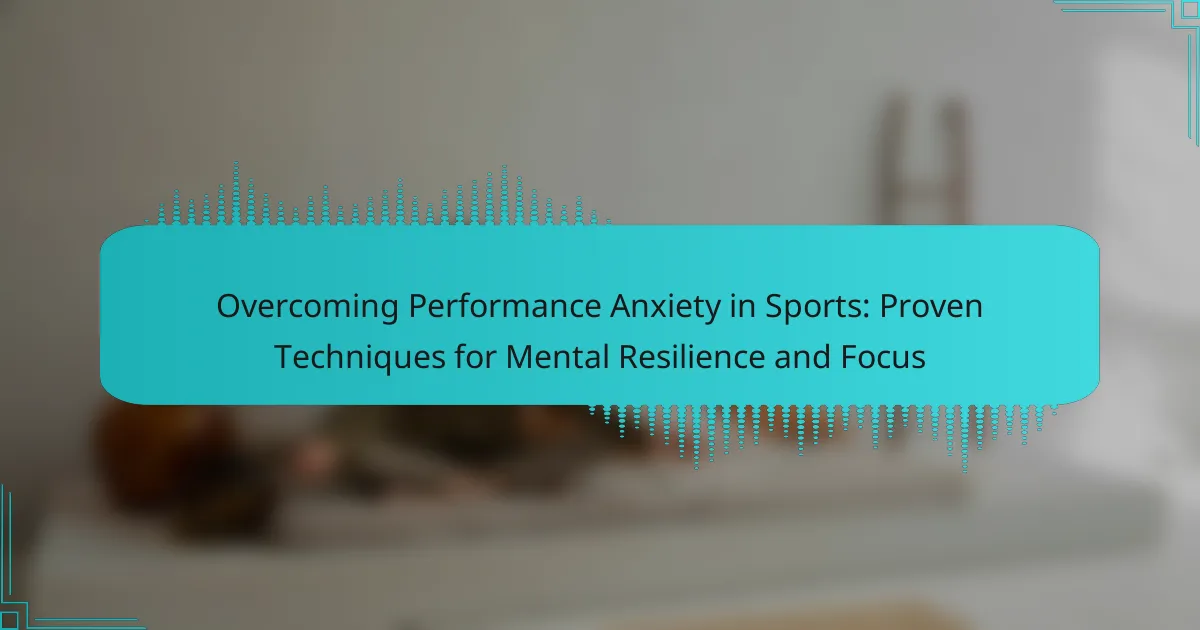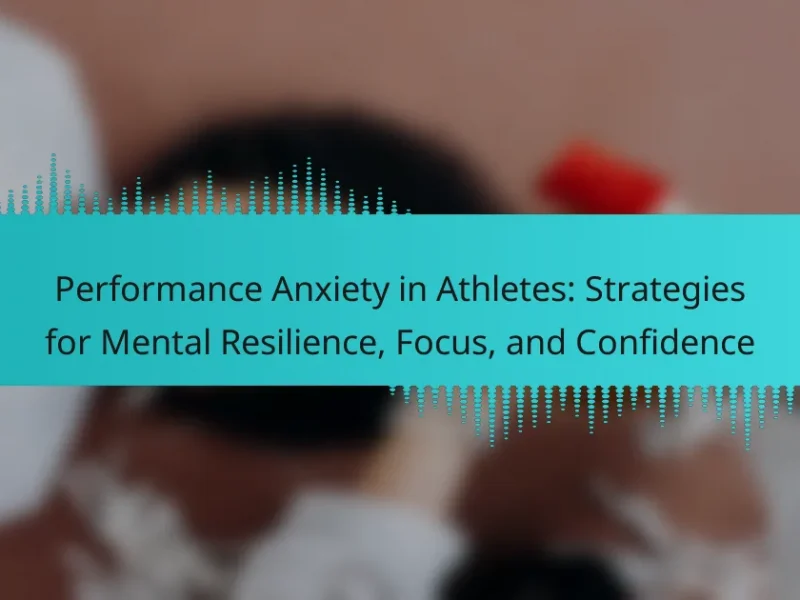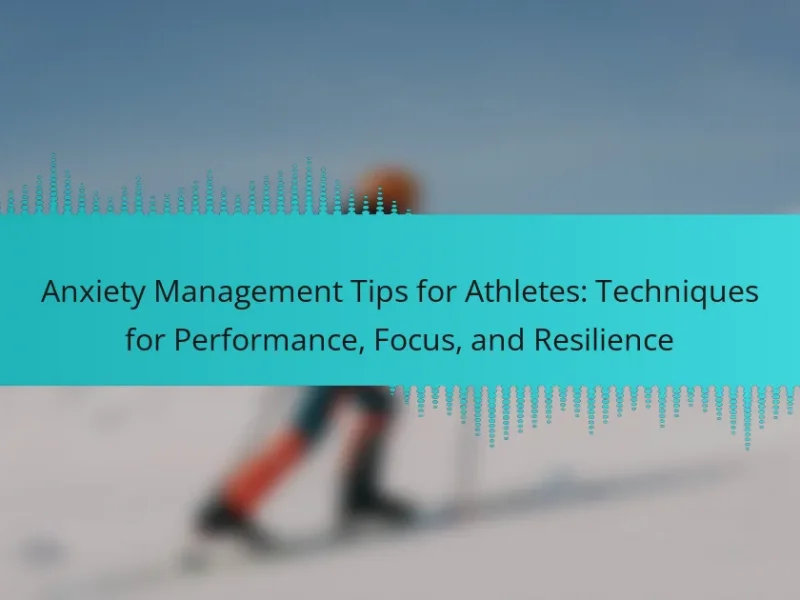Performance anxiety in sports can hinder an athlete’s ability to perform at their best. Techniques such as visualization, deep breathing, and positive self-talk can effectively combat this challenge. Mindfulness practices and cognitive restructuring further enhance mental resilience and focus. Establishing a consistent routine and seeking professional guidance can lead to improved performance and well-being.

What is Performance Anxiety in Sports?
Performance anxiety in sports refers to the intense fear of failing or underperforming during competition. To overcome this anxiety, athletes can employ techniques such as visualization, deep breathing, and positive self-talk. These methods enhance mental resilience and focus, enabling athletes to perform at their best. Studies show that practicing mindfulness can significantly reduce anxiety levels, improving overall performance. Additionally, setting realistic goals can shift focus from outcomes to personal improvement, further alleviating pressure.
How does performance anxiety affect athletes?
Performance anxiety negatively impacts athletes by hindering their focus and performance. It can lead to decreased confidence, physical symptoms like increased heart rate, and impaired decision-making. Techniques such as visualization, breathing exercises, and positive self-talk can help athletes manage and overcome performance anxiety, enhancing mental resilience and focus. Studies show that athletes who employ these strategies often experience improved performance outcomes.
What are the psychological and physiological symptoms?
Performance anxiety in sports manifests through psychological and physiological symptoms. Key psychological symptoms include excessive worry, fear of failure, and negative self-talk. Physiological symptoms often involve increased heart rate, muscle tension, and sweating. These symptoms can significantly hinder an athlete’s performance and focus. Addressing both aspects is crucial for effective management and overcoming performance anxiety.

What are the universal techniques for managing performance anxiety?
To manage performance anxiety effectively, athletes can employ techniques such as visualization, breathing exercises, and positive self-talk. Visualization helps in mentally rehearsing successful performances, creating a sense of familiarity and confidence. Breathing exercises reduce physiological symptoms of anxiety by promoting relaxation and focus. Positive self-talk shifts mindset, reinforcing belief in one’s abilities and reducing negative thoughts. These strategies enhance mental resilience and focus, crucial for optimal performance in sports.
How can breathing exercises help reduce anxiety?
Breathing exercises can significantly reduce anxiety by promoting relaxation and improving focus. These techniques lower heart rate and enhance oxygen flow, which calms the mind. For athletes, controlled breathing fosters mental resilience, allowing for better performance under pressure. Regular practice can lead to a unique attribute of increased confidence in high-stress situations. As a result, athletes can maintain composure and enhance their overall performance.
What role does visualization play in performance preparation?
Visualization plays a crucial role in overcoming performance anxiety in sports by enhancing focus and mental resilience. It allows athletes to mentally rehearse their performances, reducing stress and increasing confidence. Research indicates that athletes who engage in visualization techniques experience lower anxiety levels and improved performance outcomes. This method helps in creating a mental blueprint, enabling athletes to visualize success and manage their emotions effectively.
How can mindfulness practices enhance focus?
Mindfulness practices significantly enhance focus by training the mind to remain present. Techniques such as meditation and breathing exercises reduce distractions and improve concentration. Research shows that consistent mindfulness practice can increase attention span by up to 16%. This mental resilience is crucial for athletes facing performance anxiety, allowing them to channel their focus effectively during competition.

What unique strategies can athletes use to overcome performance anxiety?
Athletes can use visualization, mindfulness, and breathing exercises to overcome performance anxiety. Visualization helps create a mental image of success, enhancing confidence. Mindfulness techniques focus attention on the present, reducing intrusive thoughts. Breathing exercises calm the nervous system, promoting relaxation. These strategies collectively build mental resilience and focus, crucial for optimal performance.
How does goal setting contribute to mental resilience?
Goal setting enhances mental resilience by providing clear objectives and motivation. It helps athletes manage performance anxiety by focusing their attention and energy on achievable targets. Research indicates that specific, measurable goals improve focus and reduce stress, leading to better performance outcomes. Additionally, setting goals fosters a sense of control, which is crucial for overcoming challenges in high-pressure situations.
What is the significance of positive self-talk?
Positive self-talk significantly enhances performance by boosting confidence and reducing anxiety. It fosters a mindset conducive to focus and resilience during competitions. Athletes who engage in positive self-talk report lower stress levels and improved performance metrics. This technique serves as a unique attribute in overcoming performance anxiety, enabling athletes to reframe negative thoughts into empowering affirmations. As a result, positive self-talk becomes a crucial tool for mental preparation and competitive success.
How can routine and ritual help in performance settings?
Routine and ritual significantly enhance performance by reducing anxiety and increasing focus. Establishing consistent pre-performance routines helps athletes create a mental framework that fosters confidence. These rituals serve as anchors, providing familiarity in high-pressure situations. Research indicates that athletes who engage in structured routines experience lower anxiety levels and improved concentration during competitions. Incorporating specific rituals, such as visualization or breathing exercises, can further enhance mental resilience and overall performance.

What rare techniques are effective for athletes facing severe anxiety?
Mindfulness meditation, visualization techniques, and biofeedback training are rare yet effective methods for athletes dealing with severe anxiety. These techniques enhance mental resilience and focus, enabling athletes to manage stress and improve performance. Mindfulness meditation cultivates present-moment awareness, reducing anxiety symptoms. Visualization allows athletes to mentally rehearse successful performances, boosting confidence. Biofeedback training helps athletes gain control over physiological responses, promoting relaxation and focus.
How can cognitive-behavioral therapy (CBT) be applied in sports?
Cognitive-behavioral therapy (CBT) effectively reduces performance anxiety in sports by changing negative thought patterns. CBT techniques include cognitive restructuring, exposure therapy, and relaxation strategies. Cognitive restructuring helps athletes identify and challenge irrational beliefs about performance. Exposure therapy gradually exposes athletes to anxiety-inducing situations, building confidence over time. Relaxation techniques, such as deep breathing and visualization, enhance focus and reduce tension. These methods foster mental resilience, enabling athletes to perform under pressure.
What is the impact of sports psychology consultations?
Sports psychology consultations significantly reduce performance anxiety in athletes. These sessions equip individuals with techniques to enhance mental resilience and focus. Methods such as visualization, positive self-talk, and relaxation exercises are proven to improve performance under pressure. Research indicates that athletes who engage in psychological training report increased confidence and reduced anxiety levels during competitions.

How can athletes build long-term mental resilience?
Athletes can build long-term mental resilience by practicing proven techniques to overcome performance anxiety. Techniques include visualization, mindfulness, and cognitive restructuring.
Visualization involves imagining successful performances, which can enhance confidence and reduce anxiety. Mindfulness practices help athletes stay present, minimizing distractions and enhancing focus during competitions. Cognitive restructuring allows athletes to challenge negative thoughts and replace them with positive affirmations, fostering a resilient mindset.
Regularly applying these techniques can lead to improved performance and sustained mental strength over time. Incorporating mental training into daily routines helps athletes develop coping strategies that are essential for managing pressure in competitive environments.
What are the best practices for ongoing mental training?
To effectively overcome performance anxiety in sports, implement these best practices for ongoing mental training: establish a consistent routine, practice visualization techniques, engage in mindfulness exercises, and utilize positive self-talk. These strategies enhance mental resilience and focus during competition.
Establishing a consistent routine helps athletes create a sense of control. Visualization techniques allow athletes to mentally rehearse successful performances, reducing anxiety. Mindfulness exercises improve present-moment awareness, fostering calmness. Positive self-talk reinforces confidence and combats negative thoughts.
Research indicates that athletes who incorporate these practices experience lower anxiety levels and improved performance outcomes. Consistent mental training is crucial for developing long-term resilience in high-pressure situations.
How can athletes learn from performance setbacks?
Athletes can learn from performance setbacks by analyzing their experiences, adjusting strategies, and developing mental resilience. Embracing setbacks fosters growth and enhances focus. Techniques such as visualization, mindfulness, and positive self-talk can help athletes overcome anxiety and improve performance. Resilience is built through consistent practice and reflection, allowing athletes to transform challenges into learning opportunities.

What common mistakes should athletes avoid in managing anxiety?
Athletes should avoid several common mistakes when managing anxiety. Failing to recognize anxiety symptoms can exacerbate stress. Ignoring mental preparation, such as visualization techniques, can hinder performance. Overlooking the importance of breathing exercises may lead to increased tension. Additionally, neglecting rest and recovery can impact mental resilience. Lastly, seeking support from coaches or peers is vital; isolation can worsen anxiety.
What are the pitfalls of overthinking before competitions?
Overthinking before competitions can lead to increased anxiety, poor focus, and diminished performance. It often results in self-doubt and negative thought patterns that distract athletes from their training and strategy. This mental clutter can hinder decision-making and responsiveness during critical moments in competition. Techniques to combat overthinking include mindfulness practices, visualization, and establishing a pre-competition routine to enhance mental resilience and maintain focus.
How can neglecting physical health affect mental performance?
Neglecting physical health can significantly impair mental performance, leading to increased anxiety and decreased focus. Poor nutrition, lack of exercise, and inadequate sleep contribute to mental fatigue, reducing cognitive functions essential for sports performance. Research indicates that athletes who prioritize physical health demonstrate improved resilience and mental clarity, enabling them to better handle performance anxiety. Regular physical activity enhances mood and cognitive function, while a balanced diet supports brain health, ultimately fostering a stronger mental state crucial for athletic success.

What expert insights can enhance coping strategies for athletes?
Expert insights can significantly enhance coping strategies for athletes facing performance anxiety. Techniques include cognitive restructuring, mindfulness practices, and visualization methods. Cognitive restructuring helps athletes identify and challenge negative thoughts, promoting a more positive mindset. Mindfulness practices improve focus and reduce stress by encouraging present-moment awareness. Visualization techniques allow athletes to mentally rehearse successful performances, boosting confidence and mental resilience. Implementing these strategies can lead to improved performance and greater overall well-being in sports.
What are the latest findings in sports psychology for anxiety management?
Recent findings in sports psychology reveal effective techniques for managing performance anxiety. Cognitive-behavioral strategies, such as visualization and mindfulness, enhance mental resilience and focus. Research shows that athletes who practice these techniques report lower anxiety levels and improved performance. Additionally, incorporating breathing exercises can significantly reduce stress responses during competitions. These methods are increasingly recognized as essential tools for athletes aiming to overcome anxiety and enhance their competitive edge.
How can athletes leverage peer support systems effectively?
Athletes can effectively leverage peer support systems by fostering open communication and building trust. Engaging with teammates enhances emotional resilience and reduces performance anxiety. Research indicates that social support significantly impacts mental focus and overall performance. Establishing regular check-ins or group discussions can create a safe space for sharing experiences and coping strategies, ultimately strengthening team dynamics and individual confidence.

How can athletes implement these techniques in their training?
Athletes can implement techniques to overcome performance anxiety by integrating mental training exercises into their routine. Visualization helps athletes mentally rehearse success, while mindfulness practices enhance focus and reduce stress.
1. **Establish a Routine**: Create a consistent pre-competition routine that includes breathing exercises and positive affirmations.
2. **Practice Visualization**: Spend time visualizing successful performances to build confidence.
3. **Incorporate Mindfulness**: Use mindfulness meditation to stay present and manage intrusive thoughts.
4. **Seek Professional Guidance**: Work with a sports psychologist to develop personalized strategies.
By applying these techniques regularly, athletes can enhance their mental resilience and improve overall performance.
What daily practices can help integrate anxiety management techniques?
Daily practices to integrate anxiety management techniques include mindfulness, visualization, and routine physical exercise. Mindfulness helps athletes stay present, reducing performance pressure. Visualization allows them to mentally rehearse successful performances, enhancing confidence. Regular physical exercise releases endorphins, improving mood and reducing anxiety symptoms. Incorporating these practices consistently fosters mental resilience and focus in sports.
How to create a personalized anxiety management plan?
To create a personalized anxiety management plan, assess your triggers and coping strategies. Identify specific techniques that enhance mental resilience and focus during sports.
Begin by setting clear goals for your performance and emotional responses. Incorporate techniques like visualization, breathing exercises, and positive self-talk. Track your progress and adjust the plan based on your experiences.
Consider unique attributes such as your sport’s demands and personal preferences. This tailored approach will foster a supportive environment for overcoming performance anxiety.
What role does feedback play in refining coping strategies?
Feedback is crucial for refining coping strategies in overcoming performance anxiety in sports. It helps athletes identify strengths and weaknesses in their mental approach. Regular feedback enables athletes to adjust techniques, enhancing focus and resilience. Moreover, constructive criticism fosters a growth mindset, encouraging continuous improvement and adaptation. This iterative process leads to more effective coping strategies, ultimately improving performance under pressure.


